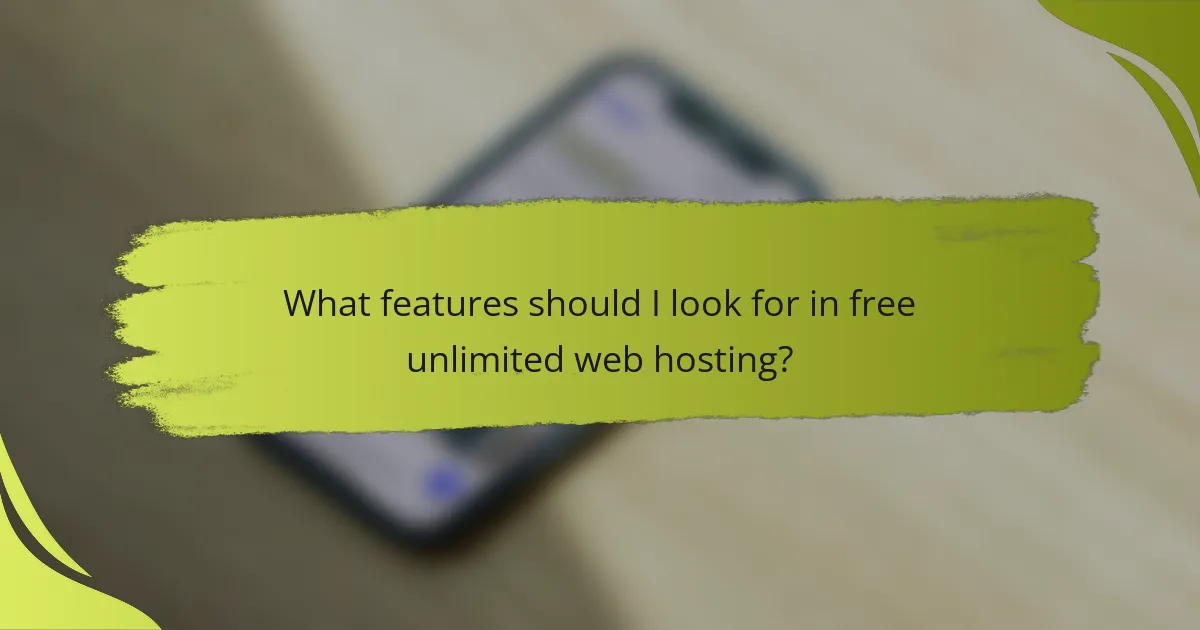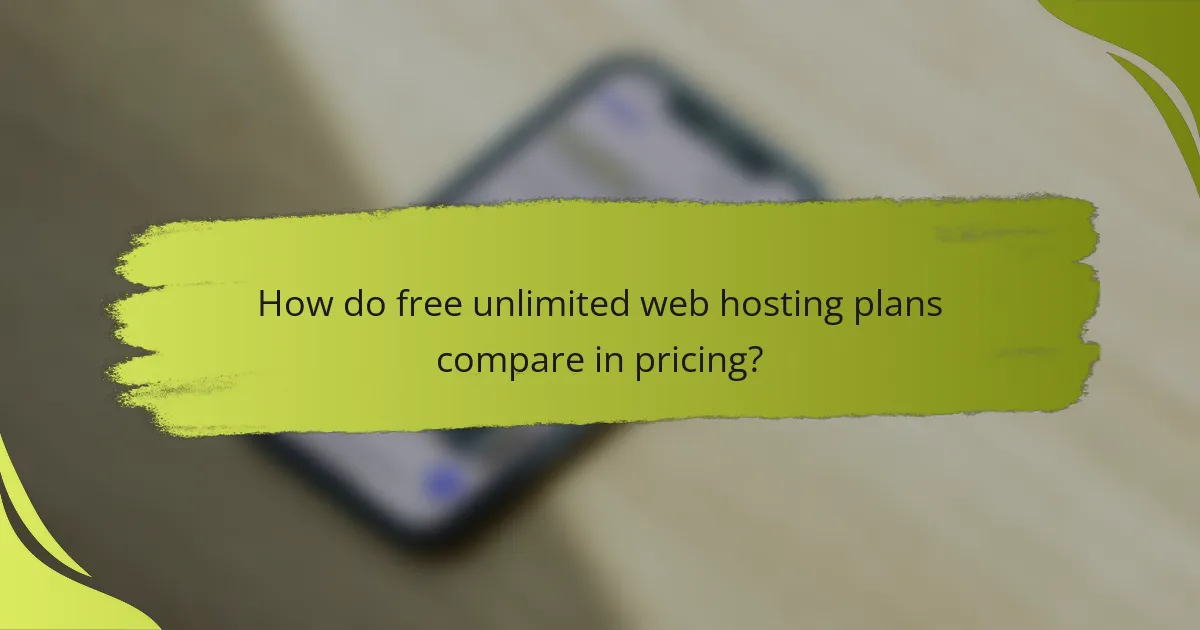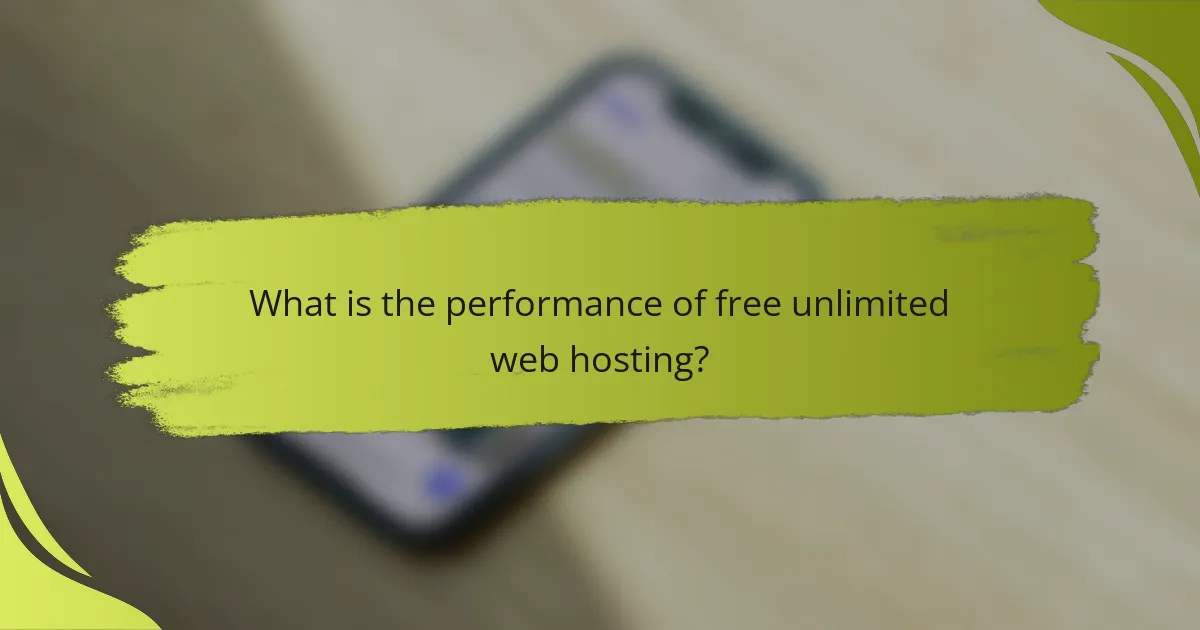Free unlimited web hosting plans provide an attractive option for individuals and small businesses looking to establish an online presence without financial investment. These plans often include essential features like storage and bandwidth, but it’s crucial to be aware of potential limitations such as customer support and advertising. Evaluating the total cost of ownership, including any hidden fees and upgrade options, will help you make an informed decision about the best hosting solution for your needs.

What are the best free unlimited web hosting plans?
The best free unlimited web hosting plans offer a combination of features such as storage, bandwidth, and user-friendly interfaces without any financial commitment. While these plans can be appealing for personal projects or small businesses, it’s essential to consider limitations like customer support and potential ads on your site.
InfinityFree
InfinityFree provides free unlimited web hosting with no time limits and no forced ads. Users benefit from unlimited disk space and bandwidth, making it suitable for various projects, from personal blogs to small business websites.
However, the platform does have some restrictions, such as limitations on file types and a lack of support for certain scripts. It’s advisable to review their terms to ensure your project aligns with their guidelines.
FreeHosting
FreeHosting offers a straightforward free hosting solution with unlimited disk space and bandwidth. Users can host one website without any ads, which is a significant advantage for those looking to maintain a professional appearance.
While the service is appealing, it comes with limitations, such as a lack of email accounts and limited customer support. Users should weigh these factors against their needs before committing.
000webhost
000webhost is a popular choice for free web hosting, providing users with 1 GB of disk space and 10 GB of bandwidth monthly. This plan is ad-free, allowing for a clean user experience.
However, users should be aware that the free plan has some downtime and limited support options. It’s best suited for testing or small projects rather than high-traffic websites.
Hostinger
Hostinger offers a free hosting plan with limited features, including 300 MB of disk space and 3 GB of bandwidth. While it provides a user-friendly interface and a website builder, the free plan is primarily a promotional tool to encourage upgrades.
Users should consider that the free plan may not be sufficient for larger projects, and they might encounter limitations on performance and support. Upgrading to a paid plan can unlock more features and better reliability.
ByetHost
ByetHost provides a free hosting service with unlimited disk space and bandwidth, making it an attractive option for users looking for flexibility. The platform supports PHP and MySQL, which is beneficial for dynamic websites.
However, users should be cautious of potential limitations in customer support and uptime. It’s advisable to read user reviews to gauge the reliability of the service before starting a project.

What features should I look for in free unlimited web hosting?
When considering free unlimited web hosting, focus on essential features such as storage capacity, bandwidth limits, uptime guarantees, and customer support options. These elements significantly impact your website’s performance and reliability.
Storage capacity
Storage capacity refers to the amount of data you can store on the hosting server. For free unlimited web hosting, providers often offer a range of storage options, typically from a few gigabytes to several terabytes. It’s crucial to assess your website’s needs to ensure you have enough space for files, images, and databases.
Keep in mind that some providers may impose restrictions on file types or sizes, so review their terms carefully. Additionally, consider future growth; choose a host that allows for easy upgrades if your storage needs increase.
Bandwidth limits
Bandwidth limits determine the amount of data that can be transferred between your website and its visitors over a specific period. Free unlimited web hosting plans often advertise “unlimited” bandwidth, but this may come with fair usage policies that throttle speeds after a certain threshold. Understanding these limits is essential to avoid unexpected slowdowns.
Evaluate your expected traffic levels and choose a plan that can accommodate them. If you anticipate high traffic, look for hosts that offer scalable bandwidth options to ensure consistent performance.
Uptime guarantees
Uptime guarantees indicate the percentage of time your website will be accessible online. Most reputable hosting providers aim for at least 99.9% uptime, which translates to minimal downtime. Free hosting services may not always meet these standards, so check for any uptime commitments.
Frequent downtime can harm your website’s reputation and SEO rankings. Consider reading user reviews and independent uptime monitoring reports to gauge the reliability of a free hosting provider.
Customer support options
Customer support options are critical for resolving issues quickly and efficiently. Free unlimited web hosting plans may offer limited support channels, such as email or community forums, rather than 24/7 live chat or phone support. Assess the availability and responsiveness of support when choosing a provider.
Look for hosts that provide comprehensive documentation, tutorials, and community resources. This can help you troubleshoot common issues without needing direct assistance, saving you time and frustration.

How do free unlimited web hosting plans compare in pricing?
Free unlimited web hosting plans typically come with no upfront costs, but they may include hidden fees or limitations that affect overall value. It’s essential to evaluate the total cost of ownership, including potential upgrade costs and domain registration fees, to understand the true pricing landscape.
No hidden fees
While many free unlimited web hosting plans advertise no upfront costs, users should be cautious of hidden fees that may arise later. Common hidden charges can include fees for additional storage, bandwidth overages, or premium support services. Always read the terms of service carefully to identify any potential costs that could impact your budget.
Upgrade costs
If your website grows beyond the limitations of a free plan, you may need to upgrade to a paid hosting option. Upgrade costs can vary widely, often ranging from a few dollars per month to higher rates depending on the features you require. Be sure to compare these costs with your expected growth to avoid unexpected expenses down the line.
Domain registration fees
Most free unlimited web hosting plans do not include a free domain name, which typically incurs an annual registration fee. This fee can range from around $10 to $20 per year, depending on the domain extension you choose. Consider this additional cost when budgeting for your web hosting to ensure you have a complete picture of your expenses.

What is the performance of free unlimited web hosting?
The performance of free unlimited web hosting can vary significantly based on the provider and their infrastructure. While these plans may offer appealing features, users often experience limitations in speed, reliability, and support, which can impact overall website performance.
Loading speed
Loading speed is crucial for user experience and SEO. Free unlimited web hosting services typically have slower loading times due to shared resources among many users. Expect loading speeds that can range from a few seconds to over ten seconds, depending on the server load and geographical location of the data center.
To improve loading speed, consider optimizing images, using caching plugins, and minimizing HTTP requests. Regularly monitor your website’s performance to identify any bottlenecks.
Server response time
Server response time refers to how quickly a server responds to a request from a user’s browser. For free unlimited web hosting, this can often be in the range of several hundred milliseconds to a few seconds. High traffic or resource-intensive applications can exacerbate delays.
To enhance server response time, choose a provider with a reputation for good uptime and low latency. Additionally, using a Content Delivery Network (CDN) can help distribute the load and improve response times for users in different locations.
Scalability options
Scalability options in free unlimited web hosting are often limited, making it challenging to accommodate sudden traffic spikes. Many free plans restrict resources such as bandwidth and storage, which can hinder growth as your website expands.
When selecting a free hosting provider, review their upgrade paths. Some may offer paid plans with better resources and support, allowing for smoother transitions as your site grows. Always consider future needs when choosing a hosting solution.

What are the limitations of free unlimited web hosting plans?
Free unlimited web hosting plans often come with significant limitations that can affect performance and usability. Users may experience restrictions on resources, advertisements on their sites, and a lack of customer support.
Resource restrictions
Free unlimited web hosting plans typically impose resource restrictions that can hinder website performance. Users may face limitations on bandwidth, storage, and processing power, which can lead to slow loading times and downtime during peak traffic periods.
For instance, while a provider may advertise unlimited storage, in reality, there could be a cap on file sizes or the number of files allowed. It’s essential to read the fine print to understand these constraints and assess whether they meet your website’s needs.
Ad placements
Many free unlimited web hosting services include mandatory advertisements on users’ websites. These ads can detract from the user experience and may not align with your brand’s image.
In some cases, the ads can be intrusive, leading to a less professional appearance. If maintaining a clean, ad-free site is important to you, consider investing in a paid hosting plan that allows for greater control over your website’s content and design.
